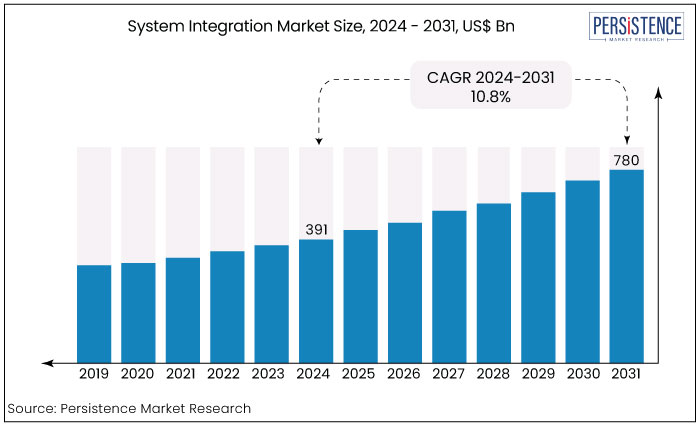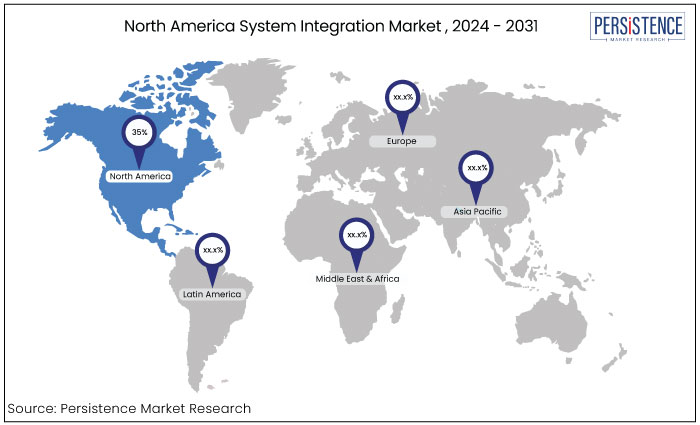Industry: IT and Telecommunication
Published Date: September-2024
Format: PPT*, PDF, EXCEL
Delivery Timelines: Contact Sales
Number of Pages: 161
Report ID: PMRREP4709
The system integration market is estimated to increase from US$391 Bn in 2024 to US$780 Bn by 2031. The market is projected to record a CAGR of 10.8% during the forecast period from 2024 to 2031. Increased demand for smart infrastructure globally fuels the market growth. North America owns notable market share owing to the robust infrastructure development.

Key Highlights of the Market
|
Market Attributes |
Key Insights |
|
System Integration Market Size (2024E) |
US$391 Bn |
|
Projected Market Value (2031F) |
US$780 Bn |
|
Global Market Growth Rate (CAGR 2024 to 2031) |
10.8% |
|
Historical Market Growth Rate (CAGR 2019 to 2023) |
9.2% |
|
Region |
Market Share in 2024 |
|
North America |
35% |
North America leads the market with around 35% of the total market share owing to the increasing adoption of cloud-based services among large organizations and the increasing use of IoT in industrial automation.
North America is home to some of the world’s leading technology companies and innovation hubs. The region's focus on adopting and integrating the latest technologies such as AI, cloud computing, and IoT, drives the demand for system integration services.
Businesses in North America significantly invest in upgrading their IT infrastructure to stay competitive. System integrators help these businesses streamline and optimize their IT systems, leading to a robust market for integration services.

|
Category |
Market Value Share 2023 |
|
Service - Infrastructure Integration |
38% |
Based on service, the system integration market is divided into infrastructure integration and application integration. Among these, infrastructure integration dominates the market. It is anticipated that infrastructure integration will experience positive growth in the coming years. The segment growth is due to the increasing necessity to establish a unified IT infrastructure that is secure, agile, and resilient while also managing costs.
The intricate business environment has necessitated that enterprises perpetually adapt and evolve in response to new IT infrastructure. It is anticipated that the demand for infrastructure integration will increase in the years ahead.
Engineering services providers are collaborating with a variety of market players to develop effective infrastructure integration solutions for smart city initiatives. In order to enhance the overall efficacy of the system, these players are outsourcing their infrastructure integration testing services.
|
Category |
Market Value Share 2023 |
|
End Use - BFSI |
25% |
Based on end use, the market is categorized into IT, defence, BFSI, healthcare and retail. Among these, the BFSI segment dominates the market.
System integration facilitates secure, rapid, and seamless banking operations by establishing an IT infrastructure that meets the essential needs of the banking industry. Numerous organizations in the BFSI industry partner with system integrators to enhance their banking services and improve brand representation, consequently stimulating demand for system integration within the BFSI sector.
The expansion of neo-banking services, the emergence of fintech startups, and the increasing demand for banking-as-a-service (BaaS) are critical drivers propelling the growth of the system integration market in the BFSI sector.
System integration consolidates fragmented processes and facilitates more intelligent organizational operations. Several key organizations recognize system integration's significance as enterprise complexity impacts their profitability and competitive capacity.
System integration technologies provide organizations with economical, centralized, and cohesive solutions for their IT infrastructure. The rising number of information technology users is a primary driver propelling the expansion of the system integration market.
The U.S. Bureau of Labour Statistics projects a 15% rise in employment within computer-related occupations by 2031. Consequently, system integration is prevalent in diverse businesses and sectors, including defence, marine systems, telecommunications and IT, aviation, oil and gas, banking, and healthcare.
Numerous internationally sanctioned firms are implementing helpful measures to enhance cross-border investments and fortify global company operations. Global entities such as the World Trade Organization (WTO), the United Nations Organization (UNO), and the World Economic Forum (WEF) are initiating their digital infrastructure solutions to entice foreign investment.
The World Economic Forum (WEF) partnered with the Digital Cooperation Organization (DCO) to initiate the digital foreign direct investment (FDI) initiative aimed at attracting public and private investments in underdeveloped nations and emerging markets. The company intends to implement its inaugural Digital FDI system in Nigeria.
International organizations' actions are anticipated to enhance the demand for system integration solutions to optimize the payment system and establish a flexible system framework enabling investors to broaden their operations in different regions.
Before 2023, the system integration market saw robust growth driven by the increasing complexity of IT environments and the need for businesses to streamline operations. The rise of digital transformation initiatives including the adoption of cloud computing, big data analytics, and IoT (Internet of Things), significantly propelled the demand for system integration services.
Organizations sought to integrate disparate systems and technologies to improve efficiency, data accuracy, and operational agility. The market supported by advancements in automation and the growing need for customized solutions across various industries, including manufacturing, healthcare, and finance. However, the market faced challenges related to high costs, integration complexities, and the need for skilled professionals.
Post-2024, the system integration market is anticipated to experience accelerated growth, fueled by continued advancements in technology and increased emphasis on digital transformation. The expansion of AI (Artificial Intelligence), machine learning, and edge computing will drive the need for sophisticated integration solutions.
The growing adoption of hybrid and multi-cloud environments will also boost demand for seamless integration services. Additionally, the rise of smart cities and the increasing need for cybersecurity integration will create new opportunities.
As organizations increasingly prioritize agility, scalability, and real-time data access, the demand for system integration services will grow with a focus on providing innovative, scalable, and secure solutions.
Digital Transformation Initiatives
Digital transformation is a significant driver of growth in the system integration market. As organizations across various industries embrace digital technologies to improve operational efficiency, customer experience, and business agility, the need for seamless integration of disparate systems becomes paramount.
Digital transformation involves the adoption of cloud computing, big data analytics, IoT, and AI, all of which require robust integration to ensure that different systems and applications work harmoniously.
System integrators play a crucial role in connecting these technologies, enabling businesses to leverage data and insights from multiple sources effectively. This trend is particularly prevalent in sectors such as manufacturing, healthcare, and finance, where real-time data integration and process automation can lead to substantial operational improvements.
The drive toward digital transformation not only fuels demand for system integration services but also encourages the development of innovative solutions that address the complexities of modern IT environments.
Cloud Computing Adoption
The widespread adoption of cloud computing is a major growth driver for the system integration market. Organizations are increasingly moving their infrastructure and applications to cloud environments to benefit from scalability, flexibility, and cost-efficiency. However, integrating cloud services with existing on-premises systems and ensuring seamless data flow across various cloud platforms pose significant challenges.
System integrators are essential in facilitating this transition by providing solutions that connect cloud-based applications with legacy systems, ensuring interoperability and data consistency.
As businesses adopt multi-cloud and hybrid cloud strategies to avoid vendor lock-in and enhance resilience, the complexity of integration increases, driving demand for specialized integration services.
The rise of cloud-native technologies such as serverless computing and containerization amplifies the need for sophisticated integration solutions to manage and optimize cloud environments effectively.
Complexity and High Costs
The complexity of integrating diverse systems and technologies poses a significant restraint on the system integration market. Organizations often have a mix of legacy systems, modern applications, and various technology platforms that need to work together seamlessly.
The intricacies involved in ensuring compatibility and interoperability can be daunting and require specialized expertise. This complexity can lead to extended project timelines and increased costs for system integration services.
The initial investment in integration technology and the cost of ongoing maintenance and support can be substantial, potentially deterring small businesses from pursuing comprehensive integration solutions.
High costs associated with system integration can also affect ROI, especially if the integration does not deliver the anticipated efficiency gains or operational benefits. These factors contribute to the reluctance of some organizations to fully embrace system integration, thereby restraining market growth.
Growth of AI and Machine Learning Integration
The integration of Artificial Intelligence (AI) and Machine Learning (ML) presents a transformative opportunity in the system integration market. AI and ML technologies can enhance decision-making processes, automate routine tasks, and provide advanced analytics capabilities.
Integrating AI and ML into existing systems allows organizations to leverage predictive analytics, improve operational efficiency, and gain actionable insights from large volumes of data. For instance, AI-driven integration solutions can optimize supply chain management, enhance customer experiences through personalized recommendations, and detect anomalies in real-time for proactive maintenance.
As businesses increasingly adopt AI and ML to stay competitive and innovative, the demand for system integrators who can seamlessly incorporate these technologies into various platforms and applications is expected to grow significantly. This trend allows system integrators to position themselves as key enablers of digital transformation through advanced AI and ML capabilities.
The system integration market is highly competitive, featuring a mix of global technology giants, specialized IT service providers, and consulting firms. Key players include IBM Corporation, Accenture, Capgemini, Cognizant, and Tata Consultancy Services (TCS), all of which offer a wide range of integration services across industries.
Leading companies compete by leveraging advanced technologies such as AI, cloud computing, and IoT to deliver seamless integration solutions. Small specialized firms focus on niche sectors providing custom solutions and expertise.
The market is driven by innovation with companies investing significantly in research and development to address the growing demand for digital transformation and hybrid cloud environments. Strategic partnerships and mergers also shape the competitive landscape, enabling firms to expand their market presence.
Recent Industry Developments in the System Integration Market
|
Attributes |
Details |
|
Forecast Period |
2024 to 2031 |
|
Historical Data Available for |
2019 to 2023 |
|
Market Analysis |
US$ Billion for Value |
|
Key Regions Covered |
|
|
Key Market Segments Covered |
|
|
Key Companies Profiled in the Report |
|
|
Report Coverage |
|
|
Customization & Pricing |
Available upon request |
By Service
By Enterprise Size
By End Use
By Region
To know more about delivery timeline for this report Contact Sales

The market is estimated to be valued at US$391 Bn in 2024
The market is estimated to exhibit a CAGR of 10.8% over the forecast period.
North America is the leading regional market for system integration.
Accenture, NEC Corporation, Atos SE, Boomi, Capgemini, are the some of the top key players in the industry.